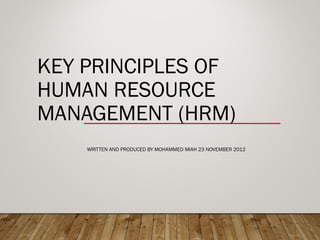
KEY PRINCIPLES OF HUMAN RESOURCE MANAGEMENT
- 1. KEY PRINCIPLES OF HUMAN RESOURCE MANAGEMENT (HRM) WRITTEN AND PRODUCED BY MOHAMMED MIAH 23 NOVEMBER 2012
- 2. DEFINITIONS & BACKGROUND: • Personnel management deals with the employment of people within an organisation. It is concerned with the transactional and administrative aspects of HR and is used in many government agencies and non-profit sectors. • While Human Resource Management (HRM) relates to the management of an organisations workforce and human resources. • HR has evolved from human relations movement of the early 20th century, when researchers began documenting ways of creating business value using different strategies.
- 3. KEY PRINCIPLES OF MANAGEMENT: • The classical approach to management includes Adam Smith’s Division of Labour. The theory was first used in a pin factory to increase efficiency. Smith explained that traditional pin makers could produce only a few dozen pins a day. • However when organised in a factory with each worker performing a limited operation they could produce tens of thousands a day.
- 4. KEY PRINCIPLES OF MANAGEMENT: • Specialisation is a technique whereby workers concentrate on performing a few tasks and then exchange their production for other goods and services. • The Command and Control form of management is based on the idea that people do what you tell them to do, and if they don’t, you yell at them until they do it. • This is also known as micromanagement where managers watch their employees carefully in a strict manner. • This type of management illustrates authority i.e. managers must be able to give orders and authority gives them that right.
- 5. THEORETICAL APPROACHES: • Good discipline from employees is a result of effective leadership. • This can be achieved by applying Abraham Maslows (1943) Hierarchy of human needs and Douglas McGregor's (1960) Theory X and Y. Both of these theories are classified as a Human Relations Approach. • Maslow explained that if certain human needs are covered, such as Physiological, Safety/Security, Belongingness, Self-Esteem and Self-Actualisation, this will increase motivation.
- 6. THEORETICAL APPROACHES: • McGregor developed a theory for human motivation and it relates to the perceptions of managers received from their employees, it is primarily concerned with attitudes not attributes. • Theory X suggests that workers need to be closely supervised and comprehensive systems of controls developed. (This corresponds with the Command and Control form of management discussed earlier). • Therefore a hierarchical structure is needed with a narrow span of control at each and every level.
- 7. THEORETICAL APPROACHES: • A Theory Y manager believes that, given the right working conditions most people will excel in different areas. • Charles Handy’s (1999) Role Culture offers employees security and the opportunity to acquire specialist expertise; performance up to a required standard is rewarded on the appropriate pay scale and possibly by promotion within the functional area.
- 8. KEY PRINCIPLES OF MANAGEMENT: • System Theory is a term used to describe the combination of both the classical approach and the human relations approach to create optimal results. • Unity of Command states that every employee should receive orders from only one superior. Like from top to bottom in an organisation.
- 9. THEORETICAL APPROACHES: • I would assume Charles Handy’s Role Culture can be used here, where he describes an organisation by having strong functional or specialised areas, coordinated by a narrow band of senior management at the top. • In other words he is explaining a top down approach to management.
- 10. KEY PRINCIPLES OF MANAGEMENT: • The Scalar Chain is another example of principles of management; it represents the line of authority from top management to the lowest ranks. • Unity of Direction suggests that each group of organisational activities that have the same objective should be directed by one manager using one plan.
- 11. A THEORETICAL APPROACH: • Charles Handy’s Power Culture is relevant here because he describes the power culture as a spider’s web with the all-important manager sitting in the centre because the key to the whole organisation sits in the centre. • A power culture is more like a dictatorship and in my opinion it fits in perfectly with unity of direction.
- 12. OTHER KEY PRINCIPLES OF MANAGEMENT: • Subordination of individual interests to the general interest. (The interests of an employee or a group of employees should not outweigh the interests of an organisation as a whole). • Initiative – Employees must use common sense. • Remuneration • Centralisation – Relates to which subordinates are involved in the managerial decision making process. • Order is needed because disorder causes chaos.
- 13. CHANGES AND DEVELOPMENT: • In the beginning during agricultural stages of trading and commerce human resources management functioned differently. • Since then technological advancement has changed how things operate in the HR department. • For e.g. Microsoft Windows keeps upgrading its operating software. • Hence the relevant departments will have to embrace and make adjustments to new operating systems.
- 14. CHANGES AND DEVELOPMENT: • Recently the government has made some changes to pension schemes such as SERPS in its annual budget. (This will affect how HR fills in certain forms). • Education has changed and developed HR, by giving people the correct skills and knowledge to carry out their work.
- 15. CHANGES AND DEVELOPMENT: • The economy and its recessions also play a huge part in shaping HR in terms of being flexible and re-structuring the whole organisation. • In addition social factors such as cultural values (people’s beliefs, gender and personal background) have affected HR over the years.